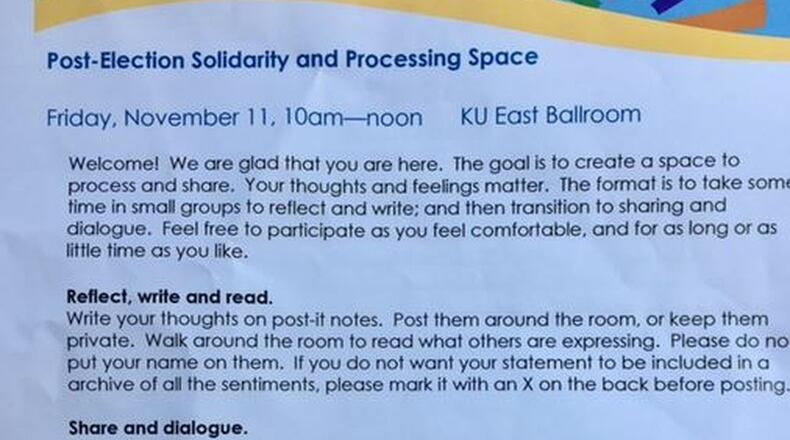Students who supported Hillary Clinton feel they cannot trust their classmates who voted for Trump, Hall said, while Trump-supporting students are afraid to be pigeonholed as sexist and racist.
“I did not see that coming at that level,” Hall said.
The reaction, though, was not unusual on area college campuses, which are offering support.
“In a way, the election is a sport, but it’s also people’s lives,” Hall said.
Trump tried to soothe anxieties among the American electorate in his victory speech, saying he wants to be a president for “all Americans.”
“Now it’s time for America to bind the wounds of division; have to get together,” Trump said. “To all Republicans and Democrats and independents across this nation, I say it is time for us to come together as one united people.”
A ‘sea shift’
Miami professor Rodney Coates said one reason why some students are upset is because they grew up with Barack Obama — who has spent eight years in the White House — as their only example of a president.
They have never experienced, nor did they expect, such a broad political “sea shift,” Coates said, adding that students should realize that “the world is not coming to an end.”
“There were some who were troubled by the election of Barack Obama, too,” he said.
Coates said the Vietnam War era was even more politically divisive.
“If we survived that then we’ll survive this,” said Coates, who served in Vietnam.
Coates heard from students who were upset about the election, but not as many as he expected he might, proving the resiliency of many students.
“The one thing America is good at is dealing with change,” Coates said.
If students don’t like the results of the election, Coates said the issue becomes “a matter of directing their energies” toward productive change in the next election.
“It’s our job to help them navigate this new terrain,” he said.
Calming nerves
For those who still need help processing the election, Miami will host more workshops. Other schools are trying to help students move on, too.
Two University of Dayton faculty members hosted a “post-election solidarity and processing space” on Friday where students could express their feelings and listen and observe those of others. The event was not open to the public and the organizers declined to comment for this story.
A flier from the event indicated that students were encouraged to share their thoughts and feelings on sticky notes and then either keep them private or share them by posting them around the room.
“This is a time to listen to and affirm perspectives,” instructions on the flier explained. “This is not the time for debate. We want to create an atmosphere of support.”
At Wittenberg University, students attended a “candlelight gathering of peace and unity” while school president Dick Helton called on students and faculty to “be a positive force as we dissect and understand political movements from all perspectives.”
At Wright State University, there has been talk of the school hosting an event to address concerns that Trump’s victory “is going to embolden” people with hateful beliefs, spokesman Seth Bauguess said.
“Those are legitimate fears to have,” he said.
Student reaction
Moneer Abouljoud, a UD senior and a Muslim, was shocked when he saw the results of the election. He was fearful of what Trump’s words meant for him and his classmates.
“His winning allowed a lot of that rhetoric to become acceptable,” Abouljoud said.
There have been reports of at least three Muslim students being attacked on college campuses in recent days, according to The Chronicle of Higher Education. The Austin American-Statesman reported that Texas State University police were investigating a flier that called for “vigilante squads” to arrest and torture university leaders spouting “diversity garbage.”
While Abouljoud said he is “not surprised at all” about hearing of attacks on other campuses, he has not seen similar sentiment at UD. He did not go to the post-election event Friday.
The UD event came after the university announced it was investigating a “discriminatory” social media post, although there was nothing directly linking the post to the election.
“Students are expected to abide by the Standards of Behavior and Code of Conduct which set out a variety of specific behaviors that are prohibited. The University focuses on the behavior, rather than the medium in which that behavior is expressed or where the violation occurs,” UD officials said in a statement about social media.
Abouljoud said he’s still seeing “a lot of people” arguing on social media, and doesn’t see an end to the tense conversations despite the end of the election.
About the Author
